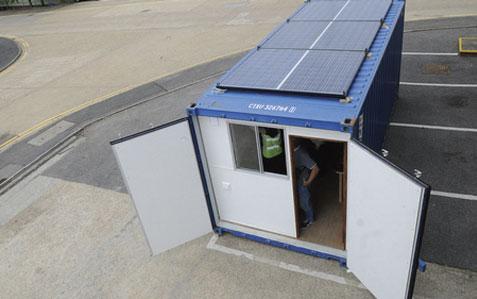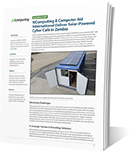CASO DE ÉXITO
NComputing & Computer Aid International Deliver Solar-Powered Cyber Café In Zambia
In 2010, Computer Aid International, a London-based charity established a solar-powered cyber café called ZubaBox in Zambia as part of the organization’s efforts to increase information technology access in rural areas of developing countries. Computer Aid International is the world’s largest, and most experienced, not-for-profit provider of practical Information Communications Technology (ICT) solutions for international development and has distributed more than 180,000 restored PCs in Africa and Latin America. Their PCs have proven to be the most cost-effective computer access solution for thousands of educational institutions and other not-for-profit organizations in developing countries.

Students can now use computers for classwork in the school’s computer lab.
Electricity Challenges
The purpose of the cyber café was to provide Internet access to school children and other members of the local community. Computer Aid International strives to enhance the quality of life for people living in developing countries such as rural Zambia through effective use of information technology. The availability of electricity in African countries is extremely low and even in cases where electricity is accessible, blackouts and failures are common occurrences of everyday life. A bigger challenge facing African countries today is the high start-up costs for solar and diesel generators. Computer Aid International sought to identify low-power equipment that was compatible with solar power as a solution to the inherent infrastructure challenges Zambia faced.
A Strategic Partner In Providing Solutions
After extensive professional product testing, Computer Aid identified 5 low-power products to be shipped to three leading universities in Africa, all of which were regional leaders in the field of Computer Science and ICT. The universities assessed traditional thin clients and arranged demos by different manufactures but found these solutions to be complex and required thirdparty hardware components, adding to the overall cost. After conducting extensive testing of NComputing’s L300 access devices, Computer Aid identified NComputing as the preferred solution. The NComputing solution is secure, easy to set up and a proven viable alternative to reduce hardware costs, power consumption, and required maintenance compared to the use of traditional desktop PCs. Computer Aid’s chief researcher Ugo Vallauri worked with Kenyatta
University in Nairobi and the National University for Science and Technology in Zimbabwe, amongst others, to come up with the best solution. In his statement, Mr. Vallauri explains, “We tested a number of methods and NComputing’s L300 access devices were the most practical. Although netbooks worked well, requiring little energy or power, they are so small that making them secure is difficult.” For their initial deployment, ZubaBox turned to Computer Aid International to purchase 1 PC, 2 NComputing L300 access devices, and 10 thin clients.
NComputing: A Practical Solution
The NComputing solution works because today’s PCs are so powerful that the vast majority of users only need and use a small fraction of desktop computing capacity. NComputing taps this unused capacity from a single PC or server so that it can be simultaneously shared by many users. Each user’s monitor, keyboard, and mouse are connected to a small and highly reliable NComputing access device, which is then connected to the shared computer. The access device itself has no CPU, memory, or moving parts- so it’s rugged, reliable, and easy to deploy and maintain, using only 1 watt of electricity. The low electricity usage is critical because as mentioned previously, electricity in Africa can be expensive and often unreliable.
NComputing has provided Zambia with a solution to address all its IT challenges including ease of management and significant savings in operating and capital expenses. The ZubaBox is constructed from a 20 foot shipping container that is converted into a fully functional Internet café providing access for up to 11 users. The café requires minimal power as the NComputing access devices tap the unused capacity from a single Pentium PC that can be simultaneously shared by many users. In addition, four solar panels are mounted on the roof and with a life of nearly 25 years, can provide up to 12 hours of electricity each day. Finally, expensive third party IT services are not required to keep the containers running, as they demand no main electricity or wired connectivity. The only requirement needed to function is power from the sun and Internet access that is acquired through cellular data connection, WI-FI or VSAT.
A New Way Of Life
The ZubaBox is an innovative concept and Computer Aid International has plans to create additional cyber cafes in sub-Saharan Africa by year-end. At this juncture, Computer Aid International has begun expanding their initiative and establishing partnerships with developmental organizations, governments, schools, and universities to provide more communities across the region with affordable low-energy Internet and IT access.
Suggested reading




